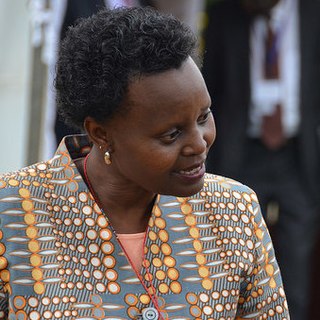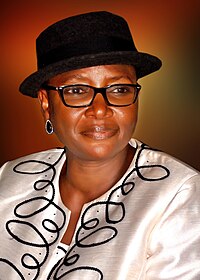The National Microbiology Laboratory (NML) is part of the Public Health Agency of Canada (PHAC), the agency of the Government of Canada that is responsible for public health, health emergency preparedness and response, and infectious and chronic disease control and prevention.
Arthur D. Levinson is an American businessman and is the current chairman of Apple Inc. (2011–present) and CEO of Calico. He is the former chief executive officer (1995–2009) and chairman (1999–2014) of Genentech.
Florence Muringi Wambugu is a Kenyan plant pathologist and virologist. She is known for her advocacy of using biotechnology to increase food production in Africa.

Cristina Garmendia y Mendizábal is a Spanish biologist and businesswoman. With no previous political career, she was appointed as Minister of Science and Innovation in April 2008 by the President of the Government of Spain, Jose Luis Rodriguez Zapatero.

The National Institute of Molecular Biology and Biotechnology, also known as NIMBB, is a research institute of the University of the Philippines (UP). It has four branches distributed across various UP campuses, namely: UP Diliman (NIMBB-Diliman), UP Los Baños (BIOTECH-UPLB), UP Manila and UP Visayas.

The Vaccine Research Center (VRC), is an intramural division of the National Institute of Allergy and Infectious Diseases (NIAID), part of the National Institutes of Health (NIH), US Department of Health and Human Services (HHS). The mission of the VRC is to discover and develop both vaccines and antibody-based products that target infectious diseases.

The Federal Ministry of Science & Technology is a Nigerian ministry whose mission is to facilitate the development and deployment of science and technology apparatus to enhance the pace of socio-economic development of the country through appropriate technological inputs into productive activities in the nation. It is headed by a Minister appointed by the President, assisted by a Permanent Secretary, who is a career civil servant. President Muhammadu Buhari, GCFR on 16 July 2022 appointed Adeleke Mamora as the Minister of Science and Technology. Dr.(Mrs) Amina Muhammed Bello Shamaki is the current permanent secretary in the ministry.
Charles Joel Arntzen is a plant molecular biologist. His major contributions are in the field of "plant molecular biology and protein engineering, as well as the utilization of plant biotechnology for enhancement of food quality and value, for expression of pharmacological products in transgenic plants, and for overcoming health and agricultural constraints in the developing world."
Life Sciences Foundation (LSF) was a San Francisco-based nonprofit organization that was established in 2011 to collect, preserve, interpret, and promote the history of biotechnology. LSF conducted historical research, maintained archives and published historically relevant materials and information.

Arbutus Biopharma Corporation is a publicly traded Canadian biopharmaceutical company with an expertise in liposomal drug delivery and RNA interference, and is developing drugs for hepatitis B infection.

Ebola vaccines are vaccines either approved or in development to prevent Ebola. As of 2022, there are only vaccines against the Zaire ebolavirus. The first vaccine to be approved in the United States was rVSV-ZEBOV in December 2019. It had been used extensively in the Kivu Ebola epidemic under a compassionate use protocol. During the early 21st century, several vaccine candidates displayed efficacy to protect nonhuman primates against lethal infection.

Organizations from around the world responded to the West African Ebola virus epidemic. In July 2014, the World Health Organization (WHO) convened an emergency meeting with health ministers from eleven countries and announced collaboration on a strategy to co-ordinate technical support to combat the epidemic. In August, they declared the outbreak an international public health emergency and published a roadmap to guide and coordinate the international response to the outbreak, aiming to stop ongoing Ebola transmission worldwide within 6–9 months. In September, the United Nations Security Council declared the Ebola virus outbreak in the West Africa subregion a "threat to international peace and security" and unanimously adopted a resolution urging UN member states to provide more resources to fight the outbreak; the WHO stated that the cost for combating the epidemic will be a minimum of $1 billion.

Henri A. Termeer was a Dutch biotechnology executive and entrepreneur who is considered a pioneer in corporate strategy in the biotechnology industry for his tenure as CEO at Genzyme. Termeer created a business model adopted by many others in the biotech industry by garnering steep prices— mainly from insurers and government payers— for therapies for rare genetic disorders known as orphan diseases that mainly affect children. Genzyme uses biological processes to manufacture drugs that are not easily copied by generic-drug makers. The drugs are also protected by orphan drug acts in various countries which provides extensive protection from competition and ensures coverage by publicly funded insurers. As CEO of Genzyme from 1981 to 2011, he developed corporate strategies for growth including optimizing institutional embeddedness nurturing vast networks of influential groups and clusters: doctors, private equity, patient-groups, insurance, healthcare umbrella organizations, state and local government, and alumni. Termeer was "connected to 311 board members in 17 different organizations across 20 different industries" He has the legacy of being the "longest-serving CEO in the biotechnology industry.
Mangina Venkateswara Rao was an Indian agricultural scientist, plant breeder, geneticist and the chairman of the Agri Biotech Foundation. He was a former Vice Chancellor of the Acharya N. G. Ranga Agricultural University and a former Deputy Director of the Indian Council of Agricultural Research (ICAR). Rao, a recipient of the Norman Borlaug Award, was awarded the fourth highest civilian award of the Padma Shri, by the Government of India, in 1999.
The Biotechnology Innovation Organization (BIO) is the largest advocacy association in the world representing the biotechnology industry.

Margaret Gathoni Karembu is a Kenyan science educator and science management specialist in the fields of technology transfer and the applications of biotechnology in Africa. She is the Director of the AfriCenter division of the ISAAA, a non-profit international organization that shares agricultural biotechnology, focusing on genetic engineering. She is the chair of the Open Forum on Agricultural Biotechnology Programming Committee, Kenya Chapter.

Michelle McMurry-Heath is a medical doctor, immunologist, and from June 2020 until October 2022 served as Chief executive officer for the Biotechnology Innovation Organization (BIO).
The National Biosafety Management Agency (NBMA) is an agency under the Federal Ministry of Environment in Nigeria. It was instituted by the National Assembly of the Federal Republic of Nigeria and the bill was signed by the President Goodluck Jonathan into law in April, 2015. The agency was established by the National Biosafety Management Agency Act of 2015 amended in 2019 which serves as a regulatory body guiding modern biotechnology activities in Nigeria to ensure the safeguarding of lives and the environment from the adverse effect of biotechnology activities in Nigeria.
National Biotechnology Development Agency (NABDA) is an agency established in 2001 under the Federal Ministry of Science and Technology, that implements policies, explores resources, conducts research, promotes, coordinates and develops of biotechnology in Nigeria.

![]() listen ) (born 25 September 1953) is a Nigerian microbiologist and served as the Director General/CEO of the National Biotechnology Development Agency (NABDA), a research agency under the Nigerian Ministry of Science & Technology until the expiration of her tenure in 2018. [1]
listen ) (born 25 September 1953) is a Nigerian microbiologist and served as the Director General/CEO of the National Biotechnology Development Agency (NABDA), a research agency under the Nigerian Ministry of Science & Technology until the expiration of her tenure in 2018. [1] 








